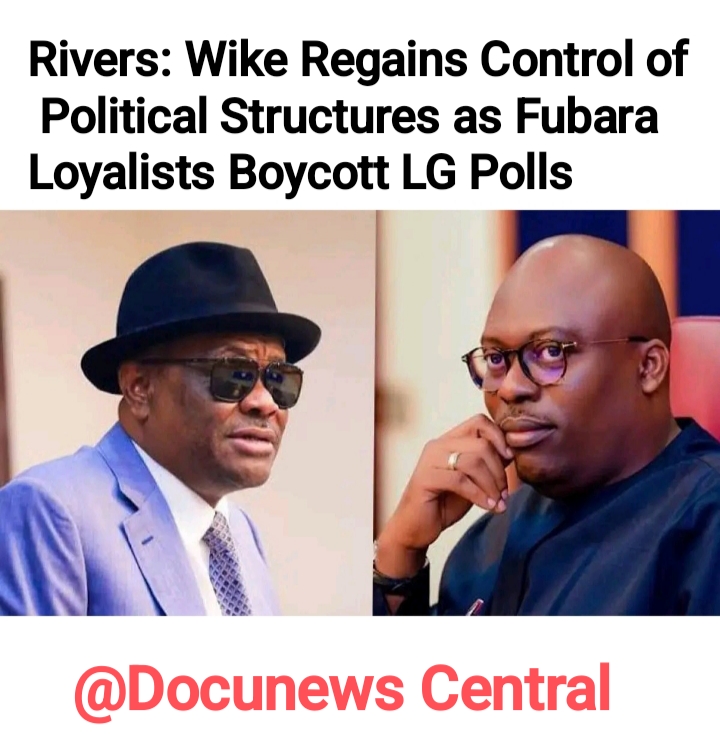
Rivers: Wike Regains Control of Political Structures as Fubara Loyalists Boycott LG Polls
Breaking News — DocuNews Central
Rivers State once again found itself at the centre of Nigeria’s political storm this weekend. The local government elections, which should have been a straightforward democratic exercise, instead turned into a loud political statement. On one side, suspended Governor Siminalayi Fubara and his loyalists boycotted the polls. On the other side, his former boss and now rival, Nyesom Wike, seized the moment to push his allies forward, tightening his grip on the state’s political structures.
The outcome has already triggered debate, raised eyebrows, and left many asking: Is Wike truly back in full control of Rivers politics?
The Boycott: Fubara’s Loyalists Stay Away
The absence of Governor Fubara was noticed immediately. The governor did not turn up at his polling unit in Opobo/Nkoro, a move seen by analysts as both symbolic and strategic. His silence was echoed by his loyalists.
Chief of Staff Edison Ehie — nowhere to be found at the polls.
Secretary to the Government, Dr. Tammy Danagogo — stayed away.
Sacked Local Government Chairmen — most of them refused to participate.
The Simplified Movement — Fubara’s core base, also missing in action.
To many voters, this was not just apathy. It was a clear boycott. A political message that the governor and his camp are unwilling to legitimize a process they believe is already stacked against them.
Wike’s Men Fill the Gap
While one camp stayed away, the other camp showed up in full force. Nyesom Wike’s allies, many of whom have remained loyal to him since his days as governor, took centre stage.
In 20 LGAs, candidates under the APC banner contested, most of them openly aligned with Wike.
In 3 LGAs, candidates under the PDP also joined the race.
From Port Harcourt City to Obio/Akpor, and down to other rural councils, Wike’s loyalists were visible. Campaign posters, mobilization efforts, and strong voter presence from his side dominated the scene.
Wike himself later praised the process, commending the Independent Electoral Commission in Rivers and hinting that the polls were a step toward normalcy.
Why the Boycott Matters
Observers say Fubara’s boycott is not without risk. By leaving the field open, he essentially handed his rival an advantage. In politics, absence often means losing ground — and in this case, Wike filled the vacuum quickly.
For ordinary Rivers residents, the boycott also brought a sense of confusion. Many wondered: “If our governor is not voting, what’s the point?” This may partly explain the low turnout seen across several polling units.
The Bigger Battle: Control of Political Structures
In Nigeria, local government elections are not just about grassroots leaders. They are about who controls the political engine room. Local councils determine who mobilizes voters, who commands grassroots loyalty, and who has the final say in future elections.
By dominating these polls, Wike appears to be regaining that control. His men are now strategically positioned to influence 2027 politics, both in Rivers and beyond.
This is why analysts say the outcome of the LG polls is more than just about chairmen or councillors. It is about who truly runs Rivers politics.
Emergency Rule and National Attention
Another twist is the ongoing state of emergency in Rivers. Wike has cleverly linked the smooth conduct of the elections to the argument that the state is stable enough for the emergency to be lifted.
This gives him an upper hand not just at the state level but also at the federal level, where decisions about emergency rule are taken. His closeness to the federal government, especially as Minister of the FCT, means his voice carries weight.
For Fubara, this makes the battle even harder. Without allies at the grassroots and without visible influence at the centre, his camp risks being sidelined further.
Voter Apathy and Public Mood
Despite the political drama, voter turnout was noticeably poor. In many areas, polling units were half-empty.
Residents cited several reasons:
Distrust in the process — many felt the outcome was already predetermined.
Confusion — Fubara’s boycott discouraged his supporters.
Security fears — some voters stayed home, unsure if the polls might turn violent.
Still, those who showed up often did so in support of Wike’s loyalists, giving the impression of a one-sided contest.
The Future of Fubara’s Camp
The big question now is: What happens to Fubara?
His boycott strategy might send a message today, but in the long run, it could weaken his grip. If his loyalists continue to abandon contests, they may find themselves cut off from the structures that truly matter.
Already, many of his supporters are whispering about survival strategies. Should they stick with him and risk irrelevance, or shift back toward Wike and the centre of power?
National Implications
Rivers State has always been a key battleground in Nigeria’s politics. With its wealth, oil, and large voting population, whoever controls Rivers has a strong say at the national level.
For Wike, this election gives him renewed relevance, not just locally but also in Abuja, where he continues to play a role in shaping political alliances.
For Fubara, it is a warning sign. Without a turnaround, his isolation could grow worse before the 2027 general elections.
Conclusion: Wike’s Shadow Looms Large
For now, it is clear: Wike has regained momentum. His loyalists are in place, his influence is visible, and his camp is celebrating.
But politics in Rivers is never straightforward. Fubara’s silence may be temporary, and his strategies may unfold in ways not yet seen.
Still, the message from the LG polls is simple: in the fight for political structures, Wike is back on top — at least for now.
🔔 Stay updated with the latest verified political stories. Subscribe now to DocuNews Central for exclusive reports, fact-checked news, and real-time updates.






